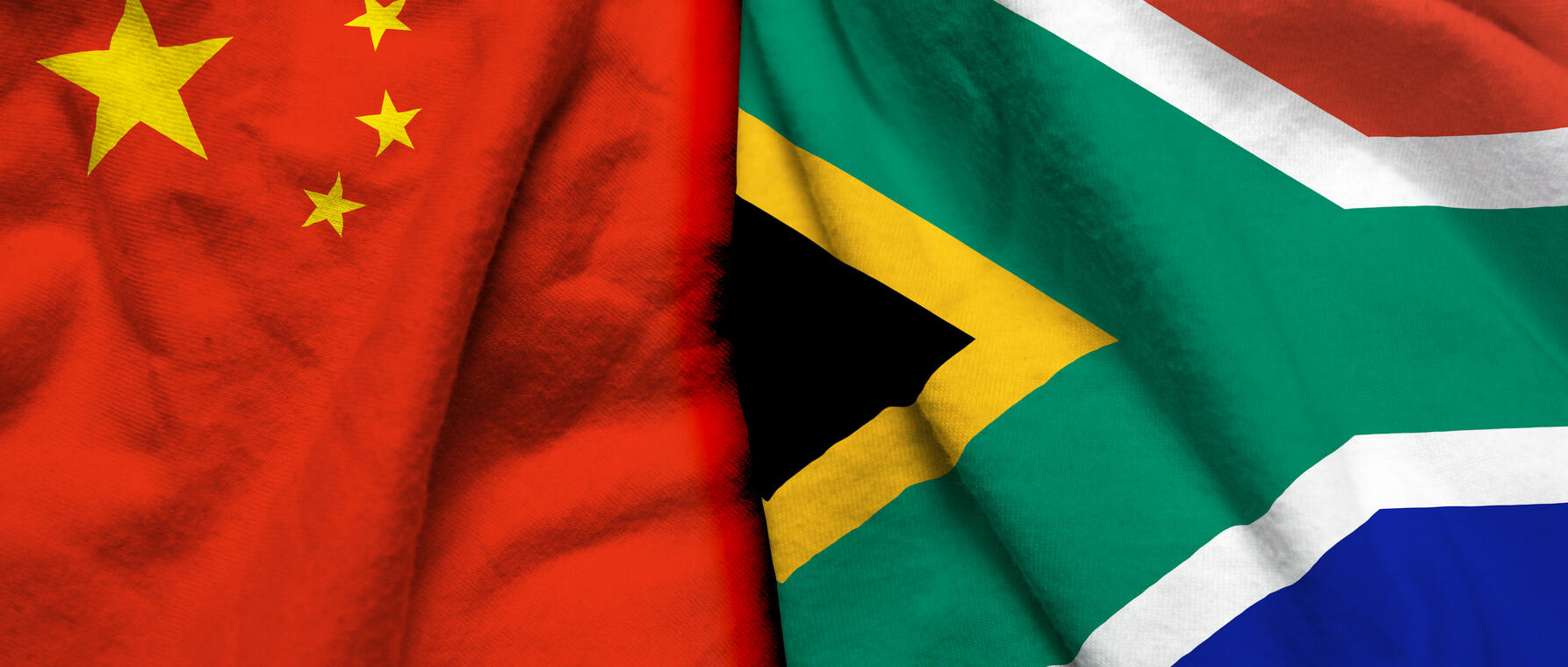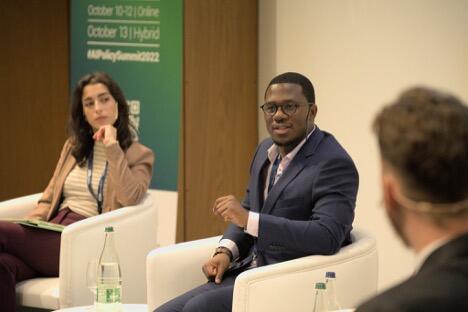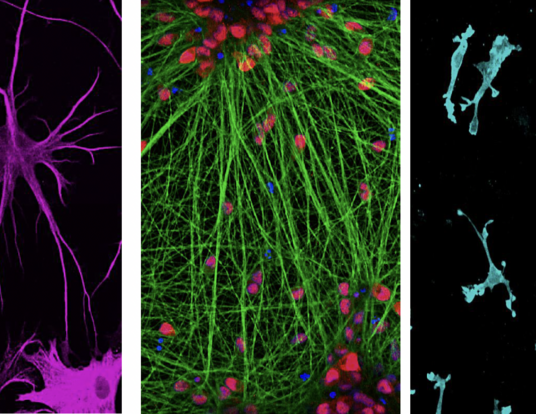Where Africa and China Meet
Bulelani Jili, PhD Student

Research at Risk: Since World War II, universities have worked with the federal government to create an innovation ecosystem that has yielded life-changing progress. Now much of that work may be halted as funding is withdrawn. Find out more about the threats to medical, engineering, and scientific research, as well as how Harvard is fighting to preserve this work—and the University's core values.
Bulelani Jili will graduate in May 2025 with a PhD in African and African American studies. He discusses his research on Africa-China relations, the way economic and technological advances increased China’s clout on the international stage, and African nations’ effort to decrease their dependence on the West.
From Independence to Bilateralism

I'm originally from South Africa. When I was working on my master's thesis at the University of Cambridge in the UK, the program’s director Adam Branch, a College alum, suggested Harvard for my PhD. I saw that it had a lot of opportunities for somebody who's already thinking in multidisciplinary ways. Harvard felt like a good landing spot.
I was working on traditional African political economy questions when I became more curious about the general intersection of Africa and China. I’d also lived in China, at a time when the Chinese Communist Party and the society in general were thinking about the country’s geopolitical role. With a fast-developing economy, China perceived it needed to be more involved in international affairs—peacekeeping initiatives, international institutions, and more broadly in geopolitics.
While studying at Yenching Academy in China, I took a class with He Yafei, China’s vice minister of foreign affairs. He talked about supporting some of the general anti-colonial initiatives of the postwar era, and how China had established bilateral relationships with African countries through diplomatic missions and commercial activities. This got me thinking about the deeper economic realities of the continent. After the independence movements of the 1950s and 1960s, African countries were still mired in asymmetrical engagements with the West and were looking for more equitable bilateral relationships worldwide.
Business Partners and Global Allies
Africa’s place in economic supply chains is key to understanding its relationship with China. Some 70 percent of Africa’s general international revenue depends on basic commodities: South Africa supplies the world with gold and platinum, Kenya exports tea, Nigeria supplies oil, and so on. This commodity economy meant Africa was basically at the bottom of the supply chain. A lot of added-value economic activity takes place elsewhere, which means that profit also takes place elsewhere.
While you're able to generate revenue from basic commodities, you're not going to create an economy that adds value in the long term. So the Africa of, say, 2010 was still following a similar supply-chain pattern it had during the colonial encounters of the early 20th century. Then, as China became interested, the question for Africa was “Are they supporting the status quo, or are they disrupting it?” And, since China was rapidly developing its technological base, what could it offer Africa in terms of technology, rather than continuing this asymmetrical, commodity-based relationship?
After 2013, China’s international Building and Road Initiative (BRI) was underway. The idea was that China needed new customers for its goods and for its surplus capital, which could be invested abroad to generate its own revenue. China could invest in infrastructure in Africa and Latin America, for example, in part because of waning US and European interest in those markets, and in part because these places were consistently construed either as too politically risky or that the markets simply weren't scalable.
In Africa, Beijing saw countries that were like themselves 20 or 30 years before, so building out basic infrastructure in these “Global South” markets would create both new Chinese consumers for Africa’s commodities and investment opportunities for Chinese capital. A key point was logistical capacity—China could advance its position in the world by building the ports, railroads, and other infrastructure that the Global South needed, boosting intracontinental trade to the advantage of both sides.
African nations, for their part, saw that a new relationship with China offered a way to grow beyond commodity-based economies and advance up the value chain. China’s BRI would help Africa develop more rapidly, without depending on the onetime colonial powers of the west.
Beyond investment in new markets, China also perceived a global context. Deeper relations with Africa offered both economic opportunity and a means to extend its geopolitical influence beyond Asia, where it hadn’t had the best of relationships (think of World War II, South Korea, and Japan). Building relationships with Africa and the rest of the Global South gave China greater influence in international organizations like the UN, where interests like the question of Taiwan would benefit from African alliances.

A Watchful Eye
My current project principally looks into the proliferation of Chinese surveillance technologies into East Africa. I thought, what are these technologies doing? How is Chinese surveillance technology being used by African governments? And simultaneously, how are Chinese corporations profiting from these new markets? Since Chinese corporations and the Chinese government are very much entangled with each other, they pursue very closely related ends—corporate profit and political advantage.
Of course, I was also curious about African voices and agency. After all, it's African stakeholders that were inviting Chinese companies into their jurisdiction. So how would these stakeholders understand their relationship with both Chinese companies and their government?
The technology I focus on are cameras with facial recognition systems and how they fit into what the Chinese term the “safe city” concept, which uses technology offered by the Chinese tech giant Huawei. In 2014, China offered Kenya about 9,000 cameras to install across the capital, Nairobi. The reasoning was that these cameras would improve the police's ability to identify and track criminal activity. Using facial recognition technology, they're not just recording activity, they could potentially identify individuals.
And that, of course, brings its own set of complicated questions. The Chinese attitude to surveillance, which permeates their society, is that it offers developing nations “cyber sovereignty.” But in Kenya, that raised a general concern about the erosion of civil liberties. There is some evidence that the introduction of surveillance cameras increases the risk of misuse by the police and government, and that certainly was on the minds of many Kenyans.
The police and government might reply that this just helps them “identify the bad guys.” Of course, the question always becomes, “Well, who are the bad guys?” And in Africa, that kind of power often rests with a very few politicians who operate under limited checks and balances.
So, the risk isn’t in Chinese technologies per se, but how to make sure the local political environment has adequate checks and balances so the technologies won’t be abused. I’m trying to elevate that part of the story—how these technologies work in the local, African context.
For example, a few years before the introduction of the facial recognition system in Kenya, there was a push by the government to collect biometrical data to offer everyone an ID card. But citizens didn’t exactly say “Yeah, sure. Here’s my face and totally use it to police me in the future.” They wanted to control their own data. So today there’s a contest for the control: the government making claims on the data and citizens resisting mass surveillance. That story is still unfolding.
Life at Eliot House
I’ve been a tutor at Eliot House for about five years. I’m on the fellowships team, helping students navigate the complexity of applying for fellowships for post-grad work, or applying for grants while they are in their sophomore and junior years. The housing system—especially Eliot House—was a deep well of warmth and community that made Harvard feel like home.
Get the Latest Updates
Join Our Newsletter
Subscribe to Colloquy Podcast
Simplecast





